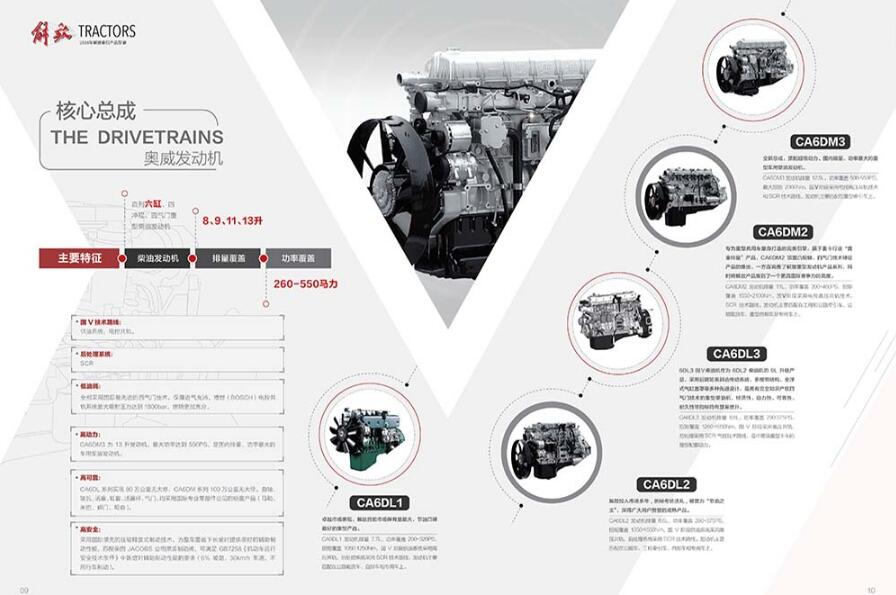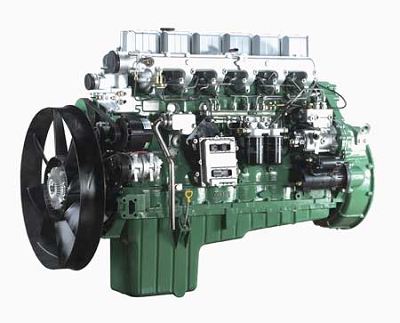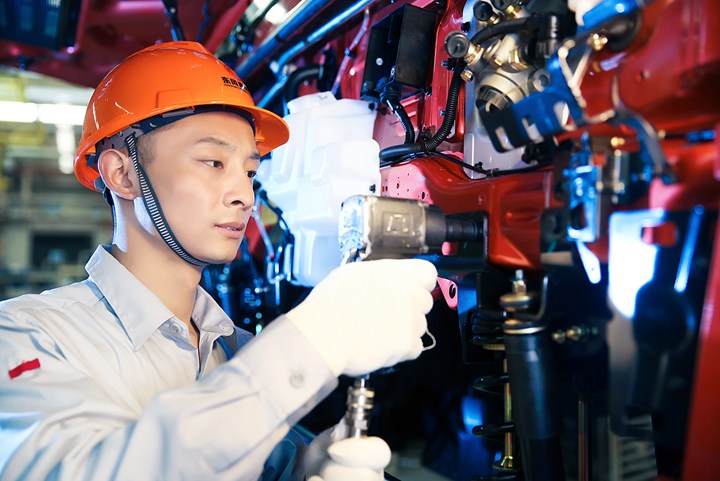The Engine Parts cover all the brand engine parts in China. Our main product cover: WEICHAI/FAWDE/SDEC/DEUTZ/YUCHAI/CUMMINS/QUANCHAI/PERKINS/CHANGCHAI and also some gearbox brand like QIJIANG/FAST/QJGT/ZF. We can provide you the realiable quality and best price truck parts to maintance your after market service. Our main product:
- engine parts; cylinder liner, piston, piston ring, oil seal, connection rod bearing, starter, injection pump, oil pump, water pump, air filter, oil filter and fuel filter;
- gearbox parts; gear, PTO, shaft and bearing.
Sdec Engine Parts,Sdec Small Engine Parts,Sdec Engine Components,Sdec Car Engine Parts Jinan JF Co., Ltd , http://www.jfsinotruk.com
In the automotive products segment, relying on the car network to achieve the "intelligent" trend of the car is accelerating, the continuous intelligence of the car host plant will also directly promote the remodeling of the car's huge front-end system. Undoubtedly, the switch of the Industry 4.0 model will drastically change the "Industry 4.0" that is in the ascendant to the ecological environment of China's auto industry and set off a new upsurge in the automotive industry. Germany, Volkswagen, BMW, Mercedes-Benz and other German cars are making efforts to manufacture "Industry 4.0" in China, and more car companies are deploying "Industry 4.0" in the areas of car networking and after-sales applications.
With the advent of the Industry 4.0 era, relying on the “cloud†server, the depot production equipment, logistics procurement, and personnel all form a large “network†that organizes the demand, production, and supply sides more intelligently and closely. Together, car manufacturing and use will be smarter.
Undoubtedly, the switch of the Industry 4.0 model will greatly change the ecological environment of China's auto industry. The analysis pointed out that the convergence of the Internet cloud and the automobile will completely subvert the existing models, including the supply chain system, production system, and after-sale system. The domestic automobile enterprises, through their own exploration, are accelerating the Nuggets Industry 4.0.
Front-end: Production efficiency will increase dramatically
It is reported that Industry 1.0 is the era of machinery manufacturing, Industry 2.0 is the age of electrification and automation, and Industry 3.0 is the age of electronic information. "Industry 4.0" is to create a highly flexible intelligent manufacturing model through communication between people, equipment and products. Not long ago, China and Germany signed the "Outline of the China-Germany Cooperative Action: Innovation in the Common Plastics" and proposed that the two countries will carry out the digitization of industrial production (Industry 4.0) cooperation.
The analysis pointed out that in our country to achieve "Industry 4.0", there will be four major components, namely, production automation, digital process management, enterprise information network, and intelligent manufacturing cloud. This means that in the production process, greater flexibility and variability, modularity and autonomy, autonomous products and autonomous production systems will be achieved.
At present, some German car companies have begun to gradually layout in the production area. BMW's newly-introduced bumper inspection equipment at the Landshut plant uses a non-contact gesture recognition system. After the bumper has finished the painting process, the inspection site can be inspected and data can be recorded by the inspector's hand gestures.
The system consists of two 3D cameras, infrared sensors and other components. The system stores 3D solid model data of bumper components and establishes a 3D spatial scanning coordinate system. When the workpiece enters the inspection area, the inspector only needs a few gestures to complete the inspection work. For example, after pointing the part where the deviation is located, the equipment can accurately record the position and deviation data of the deviation.
As the country with the largest production of automobiles, China's automobile industry is exploring the “Industry 4.0†and the initial technology of intelligentization is gradually being quoted. It is understood that the domestic industry has successfully developed an industrial 4.0 flow production line and achieved breakthroughs in wireless radio frequency technology, industrial Ethernet, online bar code, two-dimensional code comparison, image recognition, and robot applications. Among them, the 4.0 technology developed by Shanghai Mingjian Intelligent has passed the British review and obtained a total of 16 million yuan in equipment contracts from the Land Rover Aurora and Freelander 2 generation brands, and applied to the new factory of Chery Jaguar Land Rover in Changshu, Jiangsu Province. The customized domestic Aurora models for equipment production will be rolled out at the end of the year.
In the first stage of flexible production that is used in intelligent factories, the Guangdong automobile industry is gradually becoming popular. It is reported that FAW-Volkswagen's Foshan factory not only achieved MBQ modular production, but also realized intelligent management in the whole field, which can produce Volkswagen and Audi's two major brand products. Its logistics management system not only satisfies the general needs of the market, but also meets the production of multiple product mixed lines, and produces according to the individual needs of users.
Among them, the plant uses Schuler open-roll blanking lines and automatic stamping lines, as well as positioning point systems, aluminum riveting technology, intermediate frequency welding technology, cavity waxing technology, skid and EHB delivery technology. In the four major processes of stamping, welding, painting, and assembly, the degree of automation is leading in China and production efficiency is improved.
Product: Car networking has become a prototype
Compared with the slow transition of the automobile production chain to the Industry 4.0, in the automotive products segment, the trend of relying on the car network to realize the “intelligent†of automobiles is accelerating. Mainstream auto makers at home and abroad will speed up their layout and try to touch the smart “4.0 era†in the product segment.
At the Guangzhou Auto Show that ended recently, Shanghai GM, BYD, Guanzhi, and Guangzhou Automobile Chuanqi have each launched their own car networking plans.
According to reports, the Shanghai-based GM’s future-oriented strategic layout puts forward "in-vehicle information services," "mobile entertainment and consumption," and "smart driving," and will be the first to launch OnStar Anji 4G LTE service next year, and it will achieve 100% of its products by 2020. Connected, gradually build the future human, car, social interconnected ecosystem.
BYD put forward a "smart strategy," including smart car associations, smart driving, and smart security. Among them, smart car associations are mainly embodied in cloud services, PM2.5 green net system, CarPad and other smart configurations; smart driving is mainly reflected in TID gold power combination, remote control driving and other leading technologies; smart security mainly reflects 360-degree panoramic images, HUD night vision system, the latest body stabilization system and other safety equipment.
Guangzhou Automobile Chuanxi also launched the T-BOX mobile phone remote security system, which can realize remote automatic diagnosis and vehicle positioning and other common functions through smart phone operation. It also has vehicle status query, remote start and stop engine, automatic upload of vehicle abnormal information and so on. The owner only needs to finish the remote operation of the relevant car by APP software.
“The launch of OnStar 4G LTE technology marks a new stage in the development of Shanghai GM's car networking technology. It not only provides consumers with continuous WiFi hotspot support, but also helps users to maintain real-time and fast connection between their personal mobile devices and the network.†General Manager Wang Yongqing stated that the high-speed, stable, and secure interconnected environment built by the technology provides various possibilities for building an interconnected ecosystem and intelligent transportation in the future.
In addition, after years of tentative cooperation, car companies and IT cooperation have begun to gradually enter the deep-water zone. In early November, Huawei and Dongfeng Group and Changan Group signed cooperation agreements one after another to lay out strategic locations for the future of the Internet of Things. Taking the strategic layout of Huawei and Dongfeng as an example, under the support of the integration of three networks of in-vehicle networks, inter-vehicle networks, and mobile Internet, and cloud computing and big data as a support, the two parties eventually jointly developed smart cars, through the supporting person stage, personification stage, and In the symbiosis stage, intelligent cars with emotional auto-driving are finally realized.
Backend: Supply and after-sale system will change greatly
As a daily durable product, automobiles have a long industrial chain, including "raw materials - parts - production - sales - after-sales accessories". As the automotive industry gradually switches to the era of Industry 4.0, automotive OEMs continue to be smart in the production process, and will directly promote the remodeling of the car's huge front-end and back-end systems.
At present, the division of labor between automobile OEMs and parts and components companies has become more specialized, and the supply chain procurement model has become increasingly sophisticated. This means that the change in the production mode of the main engine plant will require the supplier to supply on time in a timely manner, send the station directly, and increase the participation of the product's front loading design.
It is reported that the Dongfeng Nissan plant, which has just been put into operation, tried to synchronize suppliers and achieve a consistent production rhythm. "We have achieved the goal of transferring suppliers to factories, which are direct supply and zero inventories," said Wang Jinning, head of Dongfeng Nissan Manufacturing's headquarters. On the one hand, it is to increase production efficiency. On the other hand, it is to reduce the cost of intermediate links through intelligence. Control costs.
In addition to the changes in the front-end supplier sector, the automotive aftermarket segment, under the support of cloud big data, will also implement intelligent management in all directions to enhance the customer experience. It is reported that some large-scale distributors and manufacturers are actively testing water and introducing "big data" to extend the vehicle's full-cycle service through data.
The data shows that under the background of the increasing popularity of the Internet of Vehicles, the penetration rate of the automobile industry chain has increased from 4% in 2010 to 6% in 2013 and is expected to increase to 7.5% this year. It is expected that the market size of China's car networking will reach 39 billion euros in 2018, and the output value of related services may exceed 1 trillion yuan.
Zeng Qinghong, General Manager of Guangzhou Automobile Group, also stated that the future of intelligence and big data will bring tremendous opportunities to the automotive industry. The combination of the Internet and automobiles will subvert the existing model, and the combination of online and offline development will be adopted in the future. , Collect leads from online to experience, sales, services, used cars, insurance, finance, and more.


